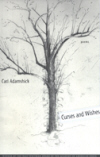Curses and Wishes
Curses and Wishes, Carl Adamshick’s award-winning debut collection, is driven by brief retrospective and introspective poems, compacting an overwhelming sense of loss in America. Adamshick at once laments and celebrates different ways of American life, ranging from small-town farms of the Midwest to the international scale of the wars in Iraq and Afghanistan. Following in the tradition of American poetry that engages with the American spirit, Adamshick transfers the fervor of Whitman’s long, sprawling lines into short-lined, energetic poems that make for a fast and invigorating read. Curses and Wishes will entrance any reader with concerns for the fate of the American landscape and its people.
Curses and Wishes, Carl Adamshick’s award-winning debut collection, is driven by brief retrospective and introspective poems, compacting an overwhelming sense of loss in America. Adamshick at once laments and celebrates different ways of American life, ranging from small-town farms of the Midwest to the international scale of the wars in Iraq and Afghanistan. Following in the tradition of American poetry that engages with the American spirit, Adamshick transfers the fervor of Whitman’s long, sprawling lines into short-lined, energetic poems that make for a fast and invigorating read. Curses and Wishes will entrance any reader with concerns for the fate of the American landscape and its people.
These poems speak to what America as a country should be and what it has become. In “Our flag,” the speaker proclaims that the flag should have “a small branch / signifying the impossible song” and even claims: “Let it be insignificant / and let its insignificance shine” as a gesture to keep the American flag as a nonthreatening entity in the world. The deft and haunting lyric of “War as the cherry blossoms,” sings out:
We prepare the same ancient armature.
The deception of language
is that we are beautiful, that we give and care
as the cherry blossoms
fall in the high heat of noon.
Adamshick brings to the reader’s attention the cyclical nature of war, of how it reinvents and masks itself, like the blossoming of cherry trees in spring. These sentiments continue in the couplet poem “The emptiness,” where, as the speaker sees the gruesome images of war in the media, he tries to distance himself from the images. He recounts these images in the lines “I am not the body that dies naked, / swollen and torn, // infested with beetles” and “I am not the bombed-out factory, / its machinery covered in snow.” The speaker feels like his “face is a hole,” as a pervasive sense of emptiness fills him.
The final long poem of the collection, “Out past the dead end sign,” focuses on a speaker, a married woman living in a small town, by covering a vast span of her life in fourteen sections separated by “and.” As the woman walks through a field, she reflects:
Here. Here is where we begin again.
Change, find ourselves chest-deep kissing
in the wet moon. Here, now, we need
to silence all this waiting.
The sections begin to build upon one another as they investigate the speaker’s marriage, childhood, and emotions. These events create a mounting tension and pace as the poem moves to its final crescendo in the final stanza as the speaker proclaims: “I’m not the dreamy one. / I know exactly where we live. / I know what I take.” This final poem serves as the culmination of well-crafted poems that know exactly where they stand, situated on an American landscape and engaging the past while remaining firmly in the present.





